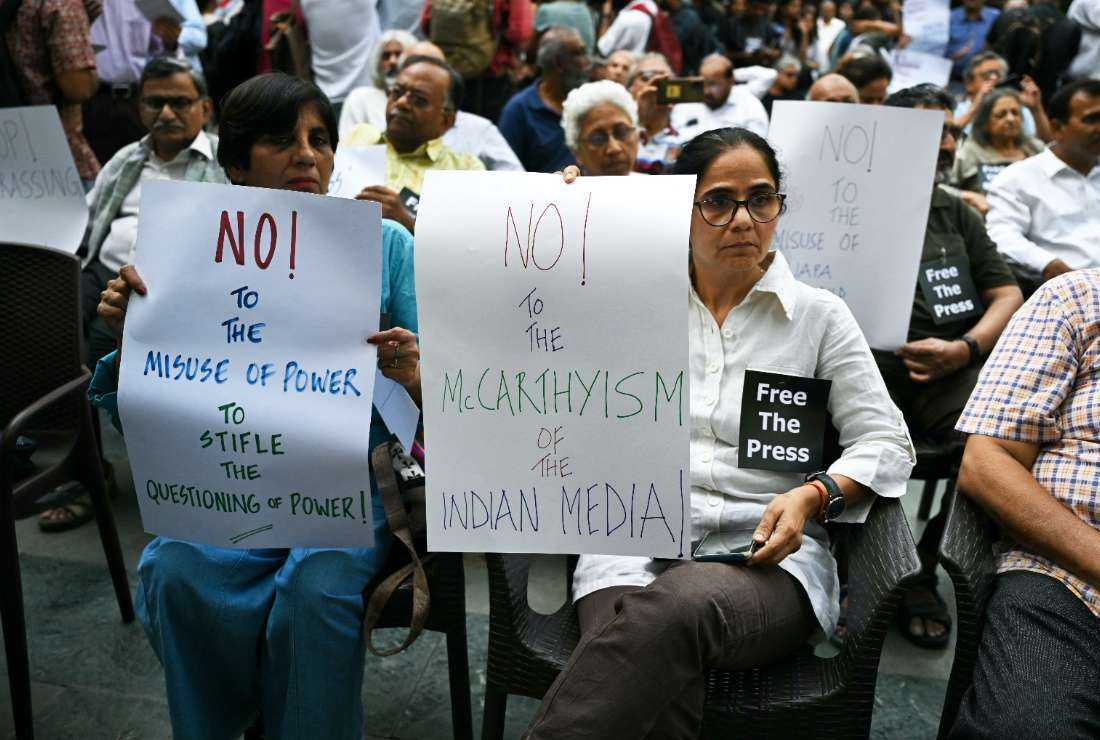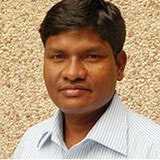Move comes after 46 media people became targets of dawn raids under a draconian anti-terror law

Indian journalists hold placards during a protest in New Delhi on Oct. 4. (Photo: AFP)
Media organizations have urged India’s chief justice to uphold freedom of speech following the arrest of a popular editor and raids on 46 journalists.
In a letter to Chief Justice D.Y. Chandrachud, 18 media bodies noted, “The fact is that today, a large section of journalists in India finds itself working under the threat of reprisal.”
The organizations, including press clubs of various cities, told the chief justice that, “it is imperative that the judiciary confronts power with a fundamental truth — that there is a constitution to which we are all answerable.”
“The country’s investigating agencies have been misused and weaponized against the press,” it said.
Their plea to Chandrachud comes in the immediate aftermath of the raids on 46 journalists, editors, writers, and professionals connected with the news portal, Newsclick.
The raids, conducted under Sections 153A (promoting enmity between two groups) and 120B (criminal conspiracy) of the sweeping anti-terror Unlawful Activities (Prevention) Act (UAPA), took place in more than 30 locations in Delhi, Mumbai and Hyderabad.
Following the raids, Prabir Purkayastha, the portal’s editor, and its physically challenged human resources head, Amit Chakravarty, were arrested, amid allegations the portal accepted “Chinese funding” to foster unrest in India.
“The invocation of the UAPA is especially chilling. Journalism cannot be prosecuted as ‘terrorism.’ Enough instances in history abound to tell us where that eventually goes,” the media groups told Chandrachud.
The police seized electronic equipment and laptops during the raids. However, they did not provide a hash value — which defines how much data is on a digital device at the time of its seizure.
“When journalists are summoned and their devices seized in the name of an investigation, there is an inherent malice in the process that must be checked,” they said.
Some of the signatories of the letter to the chief justice include the Indian Women’s Press Corps, the Press Club of India, the Foundation for Media Professionals, and the Network of Women in Media.
Purkayastha and his news website, known for its anti-government reports, were accused of receiving funds from Neville Roy Singham, a US tech multi-millionaire based in Shanghai by the New York Times in a report titled “A Global Web of Chinese Propaganda Leads to a U.S. Tech Mogul,” published in August.
The paper called Singham a Chinese propaganda tool.
“Newsclick does not publish any news or information at the behest of any Chinese entity or authority, directly or indirectly, and does not propagate Chinese propaganda,” the website said in a statement following the editor’s arrest.
Newclick, founded in 2009, became a target of the government in 2020 when the Delhi Police registered a case, accusing it of a criminal breach of trust, cheating and criminal conspiracy.
In 2021, the federal Enforcement Directorate raided Newsclick, leveling charges of money laundering and paid news.
India is placed at an abysmal 161 among 180 countries surveyed in the Press Freedom Index and has fallen 50 points over the last 10 years.
In February this year, the authorities searched the BBC’s New Delhi and Mumbai offices over accusations of tax evasion.
The Federation of Catholic Associations of Archdiocese of Delhi (FCAAD) condemned the raids ahead of the polls next year where current Prime Minister Narendra Modi is seeking a third term.
Recalling the tragic death of Jesuit priest Father Stan Swamy as an under-trial prisoner in Mumbai on July 5, 2021, the FCAAD asked the government to provide enough facilities to the physically challenged Chakravarty in jail.
“As a person with disabilities, he [Chakravarty] has a right to be protected from inhuman treatment and torture.”
Father Swamy, accused of being a sympathizer of an outlawed Maoist group, was charged under the anti-terror law along with 15 others in the Bhima-Koregaon case in western Maharashtra state.
In a report in 2022, the US-based Arsenal Consulting, a digital forensics firm, disclosed how 84-year-old Father Swamy was arrested based on evidence planted into his computer’s hard drive by hacking it.

